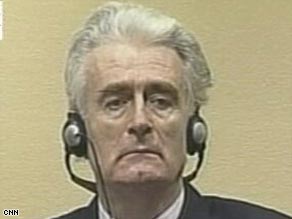Karadzic claims arrest irregularities

Radovan Karadzic has appeared in court to face charges that include genocide and war crimes.
The man accused of being the political power responsible for the Srebrenica massacre of Muslims and the siege of Sarajevo said the court had been misinformed about the date of his arrest.
The court gave July 21 as the day Serbian authorities captured the defendant in Belgrade. When the arrest was first made public, his lawyer in Serbia said Karadzic had been arrested three days earlier.
Karadzic, without the bushy beard he wore when he was arrested, listened as Judge Alphons Orie read a summary of the charges against him, 11 counts in all, involving genocide, crimes against humanity and war crimes.
Karadzic did not enter a plea but did say he would be representing himself before the International Criminal Tribunal for the Former Yugoslavia at The Hague, Holland.
Despite the seriousness of the charges, Karadzic did manage a smile when asked whether his family knows he is in detention. He answered wryly, "I don't believe there is anyone who doesn't know that I am in the detention unit."
His next court appearance will be August 29. If Karadzic enters no plea at that hearing, the judge will enter a not guilty plea on his behalf. and pretrial proceedings will begin.
The actual trial would not begin for several months, Chief Prosecutor Serge Brammertz said before the hearing. If Karadzic pleads guilty, there will be no trial, and the judge will set a date for his sentencing.
Karadzic has long eluded the U.N. war crimes tribunal, reinventing himself as an alternative medicine practitioner and growing a long white beard and mustache to disguise himself.
Karadzic claimed that he made a deal in 1996 with then-U.S. diplomat Richard Holbrooke that involved his withdrawal from public life. "According to [the offer] ... I had to withdraw from public life, I had to make certain gestures, and in return the U.S.A. would fulfill their commitments. This was on behalf of the United States of America," he emphasized.
He said attempts were made to persuade the chief prosecutor to withdraw his indictment.
"I believe this is very important for my fate and for my legal position," he said. "I want to show why I am appearing before this court only now, rather than in '96, '97 or '98, when I had the intention of appearing here, but at that time, I was in danger of being liquidated because I had made a deal that ... Mr. Holbrooke tried to honor."
Karadzic added, "This is a matter of life and death. If Mr. Holbrooke still wants my death and regrets that there is no death sentence here, I wonder if his arm is long enough to reach me here."
Orie said the court was not aware of any such agreements and urged him to submit the matter in writing.
Holbrooke said Karadzic's claim was "a flat-out lie."
Karadzic, in response to queries from the judge, identified himself and gave his family's address in Pale, Bosnia, as his most recent address. ![]() Karadzic showed little emotion »
Karadzic showed little emotion »
When pressed, he also gave an address in Belgrade. "If you're asking me about my unofficial address, the one I had under my other identity ... it was in Belgrade," he said.
The charges against Karadzic stem from the 1992-95 war in Bosnia-Herzegovina, when Karadzic was president of a breakaway Serb republic.
The tribunal accuses Karadzic of leading a campaign that killed thousands of men, women and children -- mainly Bosnian Muslims and Bosnian Croats -- as part of a violent effort to rid the region of non-Serbs.
Forces under Karadzic's command rounded up tens of thousands of non-Serbs and held them in camps where, an indictment says, the Serbian forces "tortured, mistreated, sexually assaulted and killed non-Serbs," the tribunal said Wednesday.
"The indictment also charges Karadzic with responsibility for a protracted campaign of shelling and sniping of civilian areas of Sarajevo, killing and wounding thousands of civilians, including children and the elderly," a tribunal statement said before the hearing.
The Bosnian war was Europe's bloodiest conflict since World War II and the longest of the wars spawned by the breakup of Yugoslavia in the early 1990s.
Backed by the government of then-Yugoslav President Slobodan Milosevic, Bosnian Serb forces seized control of more than half the country and launched a campaign against the Muslim and Croat populations that introduced the term "ethnic cleansing" to the world.
Karadzic was removed from power in 1995, when the Dayton Accords that ended the Bosnian war barred anyone accused of war crimes from holding office.
Though he portrayed Serbs as victims, Karadzic is accused of responsibility for the massacre at Srebrenica, a U.N. "safe area" Serb troops overran in July 1995.
Nearly 8,000 Bosnian Muslim men and boys were killed at Srebrenica, the worst European massacre since World War II.





